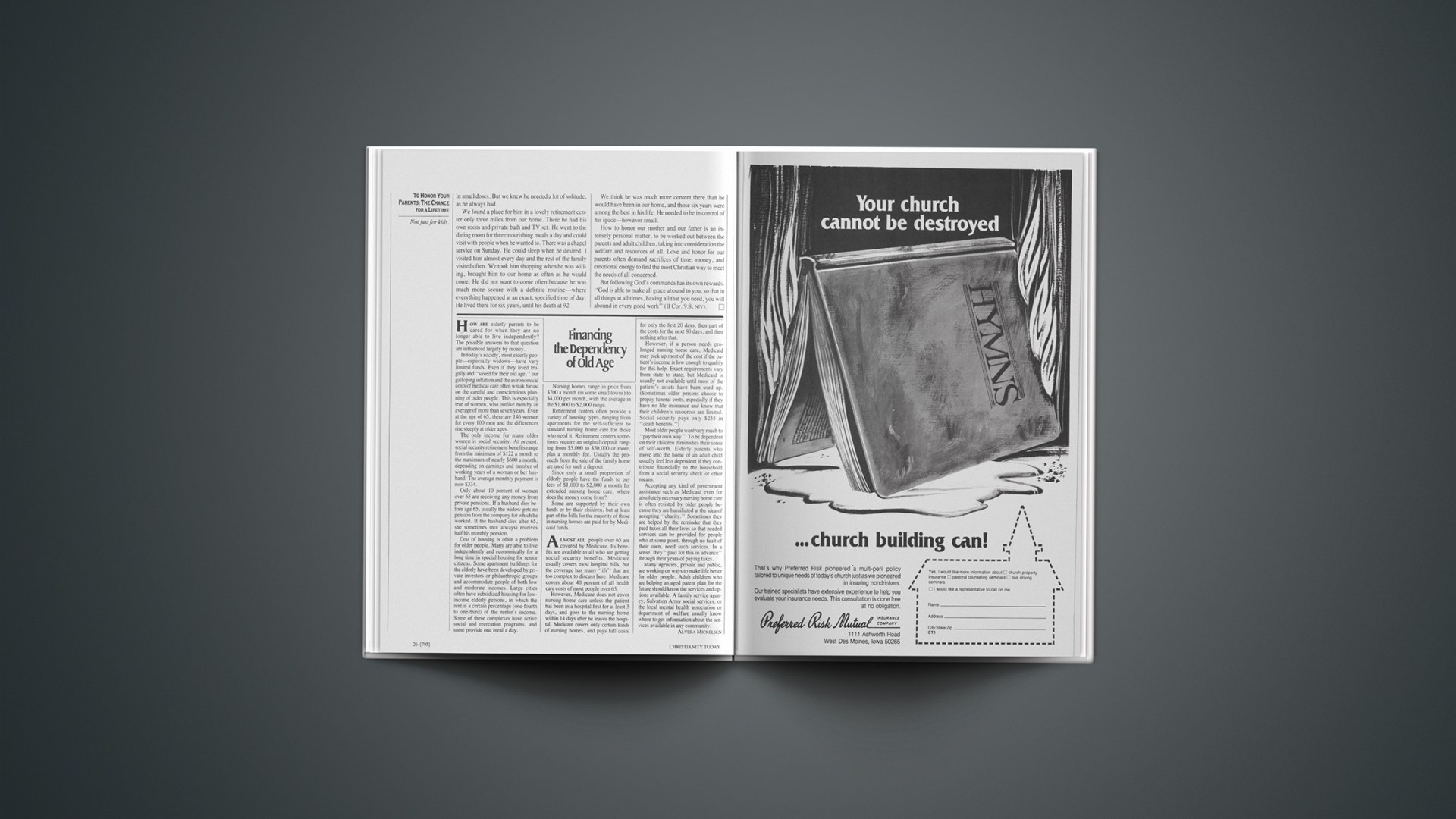How are elderly parents to be cared for when they are no longer able to live independently? The possible answers to that question are influenced largely by money.
In today’s society, most elderly people—especially widows—have very limited funds. Even if they lived frugally and “saved for their old age,” our galloping inflation and the astronomical costs of medical care often wreak havoc on the careful and conscientious planning of older people. This is especially true of women, who outlive men by an average of more than seven years. Even at the age of 65, there are 146 women for every 100 men and the differences rise steeply at older ages.
The only income for many older women is social security. At present, social security retirement benefits range from the minimum of $122 a month to the maximum of nearly $600 a month, depending on earnings and number of working years of a woman or her husband. The average monthly payment is now $334.
Only about 10 percent of women over 65 are receiving any money from private pensions. If a husband dies before age 65, usually the widow gets no pension from the company for which he worked. If the husband dies after 65, she sometimes (not always) receives half his monthly pension.
Cost of housing is often a problem for older people. Many are able to live independently and economically for a long time in special housing for senior citizens. Some apartment buildings for the elderly have been developed by private investors or philanthropic groups and accommodate people of both low and moderate incomes. Large cities often have subsidized housing for low-income elderly persons, in which the rent is a certain percentage (one-fourth to one-third) of the renter’s income. Some of these complexes have active social and recreation programs, and some provide one meal a day.
Nursing homes range in price from $700 a month (in some small towns) to $4,000 per month, with the average in the $1,000 to $2,000 range.
Retirement centers often provide a variety of housing types, ranging from apartments for the self-sufficient to standard nursing home care for those who need it. Retirement centers sometimes require an original deposit ranging from $5,000 to $50,000 or more, plus a monthly fee. Usually the proceeds from the sale of the family home are used for such a deposit.
Since only a small proportion of elderly people have the funds to pay fees of $1,000 to $2,000 a month for extended nursing home care, where does the money come from?
Some are supported by their own funds or by their children, but at least part of the bills for the majority of those in nursing homes are paid for by Medicaid funds.
Almost all people over 65 are covered by Medicare. Its benefits are available to all who are getting social security benefits. Medicare usually covers most hospital bills, but the coverage has many “ifs” that are too complex to discuss here. Medicare covers about 40 percent of all health care costs of most people over 65.
However, Medicare does not cover nursing home care unless the patient has been in a hospital first for at least 3 days, and goes to the nursing home within 14 days after he leaves the hospital. Medicare covers only certain kinds of nursing homes, and pays full costs for only the first 20 days, then part of the costs for the next 80 days, and then nothing after that.
However, if a person needs prolonged nursing home care, Medicaid may pick up most of the cost if the patient’s income is low enough to qualify for this help. Exact requirements vary from state to state, but Medicaid is usually not available until most of the patient’s assets have been used up. (Sometimes older persons choose to prepay funeral costs, especially if they have no life insurance and know that their children’s resources are limited. Social security pays only $255 in “death benefits.”)
Most older people want very much to “pay their own way.” To be dependent on their children diminishes their sense of self-worth. Elderly parents who move into the home of an adult child usually feel less dependent if they contribute financially to the household from a social security check or other means.
Accepting any kind of government assistance such as Medicaid even for absolutely necessary nursing home care is often resisted by older people because they are humiliated at the idea of accepting “charity.” Sometimes they are helped by the reminder that they paid taxes all their lives so that needed services can be provided for people who at some point, through no fault of their own, need such services. In a sense, they “paid for this in advance” through their years of paying taxes.
Many agencies, private and public, are working on ways to make life better for older people. Adult children who are helping an aged parent plan for the future should know the services and options available. A family service agency, Salvation Army social services, or the local mental health association or department of welfare usually know where to get information about the services available in any community.










